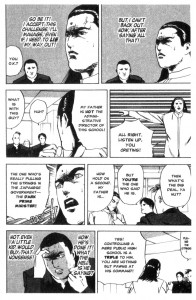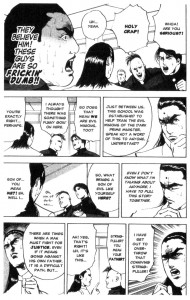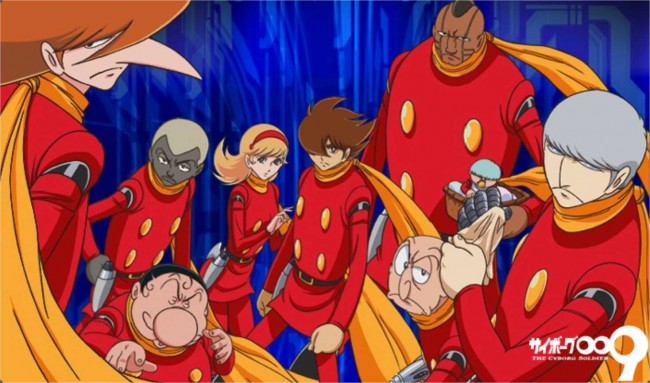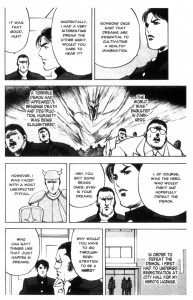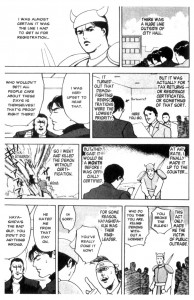
Breaking the Wednesday habit
June 25th, 2012 Posted by david brothersHow I consume comics today is markedly different from how I consumed comics a year ago. Around this time last year, I was probably buying around twenty floppies per month. I don’t remember the exact number, but twenty feels right. A big week would run me around twenty bucks, maybe six comics, and I hit the shop every week. There weren’t a lot of DC comics on my list, I don’t think, but I did buy a gang of Marvels. I didn’t have a huge stack every week, but I got by. I read a lot.
Time passed and a lot of series I liked got canceled. Around the same time, I decided that I was spending too much time on bad comics. Comics have two components — writing and art — and if one side is lacking, the entire product suffers. So I decided to do a better job of only buying comics that clicked on both levels. I’d read Morrison’s Batman-related stuff based on who was drawing it, but I wasn’t applying the rule evenly. Last year, I made the conscious decision to look at everything I was buying and make sure I wasn’t wasting my money on things that would make me grimace. More comics got cut.
Late last year, I made another decision. I wanted to buy more digital comics because I want to use the space in my apartment for something other than stacks of paper. Luckily, Marvel, DC, Image, and Dark Horse were ramping up their day & date digital comics releases. Pow: more floppies gone. I just checked my emails and by January 2012, I was just buying Hulk, Thunderbolts, and Hellblazer in floppy form, with all the other comics going directly to my iPad.
Somewhere around the border between February and March, I quit Marvel and DC and started buying 2000 AD in print. I had the option of going digital with it, but something about reading it in print seemed attractive. There’s a 2000 AD experience, I think, that I wanted to get a taste of. As of this moment, 2000 AD is the only comic on my pull list. Everything else I’m interested in is either available digitally or the sort of book you buy from Amazon on a whim, rather than subscribe to.
On top of all that, and I hope you’re sticking with me through all this preamble, I recently realized that I hate paying 3 and 4 dollars for digital comics. I don’t own them, I don’t get to keep them, and if I’m paying as much as an entire print comic, and two dollars less than an album on Amazon MP3, then I need something more than a permission slip to read a comic in exchange. So I made the decision to stop buying new digital comics. I buy them a month behind now, when the price drops to $1.99. $1.99 is still a bit much for ~20 pages of funnybooks, but it feels better. Easier on the wallet, too. There are a few exceptions — Prophet, and honestly I’m probably going to break on Saga soon because issue 3 was so good and I hear 4 is better — but for the most part, I’m reading new comics a month late.
So, the funny thing about buying 2000 AD in print is that Diamond, the biggest comics distributor in the country, is borderline worthless when it comes to 2000 AD. I started with prog 1765 (they call them progs, roll with me here, it’s not that weird) and picked up prog 2012, an anniversary issue, and progs 1766 and 1767 around the same time or a week later. Cool, right? It’s a solid start. But I’m looking at my stack now and I’ve got 1765-1767, 1768-1772, 1774, 1775, 1777, and 1778. See the gaps? I picked up 1775 before I got 1774, too, and a few other issues came out of order. According to an email I got this week, progs 1779-1781 all came out this week.
2000 AD is a weekly serial anthology. Diamond makes it very hard to read it in order, and you can’t even rely on the shipping lists. I bought 1778 three weeks ago, and 1779 came out this week? Really? As a result, I go to the comics shop around once a month now, hoping against hope that 1776 and the other missing issues have shown up in the interim. Sound aggravating? You have no idea. I’ve been looking forward to reading Al Ewing & Brendan McCarthy’s Zaucer of Zilk for months, and then I couldn’t even do that because the issues progs don’t show up.
The Wednesday comics experience is pretty well broken for me. 2000 AD‘s slipshod schedule got me out of the habit of going to get comics and immediately reading them every week. I stockpile them now, and read them when I have two or three I can pore over. I buy digital comics on Wednesday still, usually while I’m having breakfast, and I’ll read one or two of them at lunch if I’m excited. But usually, I’ll wait until I’m ready to read them over the weekend or the next week. I bought Chaykin’s American Flagg last week, and Xander and Kevin Cannon’s Double Barrel and haven’t touched either, even though I’m really into them. It took me a couple weeks to read Brubaker & Phillips Fatale 5. The only comic I reliably read on release day any more is Viz’s Weekly Shonen Jump Alpha, and that’s because it’s uploaded immediately before lunch on Mondays and has Eiichiro Oda’s One Piece in it.
It’s sorta weird not being plugged into the Wednesday cycle. I was part of that crowd for a long time, and without weekly mainstream comix blogging, 4thletter! definitely wouldn’t be what it is today without being plugged into that cycle. I already watch TV on a delay — which means that Legend of Korra was thoroughly spoiled for me before I got within spitting distance of the finale, thanks Tumblr — and now I read comics on a delay, too.
It’s weird, but it’s also less stressful. I don’t feel compelled to chime in on things. I’ll still throw out a joke if I see some dumb-looking news, but I don’t have to chime in on the latest story about Wonder Woman’s stupid pants any more. I relapsed like an idiot a little bit ago, but for the foreseeable future? That side of reading and talking about comics is dead to me. I just get to read what I like, write about it if the spirit moves me, and enjoy things at my own speed.
There’s this feeling, an impulse, that part of being a good writer about comics means that you have to be timely. I find myself pushing away from that impulse lately, if only because snap judgments are growing increasingly unsatisfying. I want to let something marinate before I try to dig into it. I need that time to sit and just let my mind wander over the folds of a book, rather than reading it and immediately cranking out how I feel about it. I know my writing well enough that I can do either/or, but I vastly prefer the stuff I’ve written that leaves me at the back of the pack, but with a stronger argument than the front-runner.
I’m curious to see where the evolution of how I read comics goes next. I like where I am now, but a significant part of me bristles at the fact that my friends are a book ahead of me. I hate the idea of being behind, even if behind is a fake idea in this situation. I may loosen the $1.99 digital rule at some point, but I’m enjoying my newfound freedom. I don’t miss the Wednesday grind.








